Editor’s Note: Brookings President Strobe Talbott addressed an audience at Washington University in St. Louis. These are his remarks as prepared for delivery. Watch the video of his speech here (at wustl.edu, scan to 10:00 min.).
Thanks, Kent [Syverud, the dean of the law school]. And thanks to you, Mark [Wrighton, chancellor of the university], for your commitment to the partnership between WashU and Brookings. It’s working well because of your vision and leadership—and also because of the engagement of your faculty with my colleagues in DC. Three are with me today: Steve Bennett, our Chief Operating Officer, who has done so much to build a solid foundation for the partnership; Bill Galston, who is part of a collaboration between the Brookings Governance Studies Program and the Danforth Center on Religion and Politics here; and John-Michael Arnold of our executive office.
While Brookings and WashU are both “going global” in various ways, we’re still originally and essentially American institutions. We both owe a lot to Robert S. Brookings, who had a classically American biography. He was born back East, ventured westward as a teenager, and settled here in St. Louis.
In addition to his success as a businessman, his generosity as a philanthropist, and his prominence as an educator, Robert Brookings answered a call to public service. A Republican, he was recruited by a Democratic president, Woodrow Wilson, to help improve the efficiency of the U.S. government.
That experience convinced Brookings that what goes on inside government would benefit from ideas generated outside government—ideas based on independent scholarly research.
Ninety-five years later, that is still the premise of the think tank that bears his name. It’s also the premise of much work that goes on here at WashU.
So we not only share a common history and a common benefactor—we share a common challenge.
Our mission is to help analyze and solve the problems facing our nation. They are many and complex. But they can, I believe, be clustered under four broad rubrics.
- First, we need to complete our recovery from the Great Recession of 2008-2009 in a way that creates jobs and restores the long-term solvency of our economy.
- Second, we must rebuild the fading confidence of many Americans about whether ours is still a land of individual opportunity for us—and for our children.
- Third, we must preserve our environment and promote prosperity by reducing carbon emissions and developing sources of clean energy.
- And, fourth, we must exercise global leadership in an age of dynamic change and in the face of existential perils, like nuclear proliferation and climate change.
Looming over those specific challenges is the general one of strengthening another original, essential, and supremely American institution—our distinctive form of constitutional democracy.
Whether or not we Americans are up to the tasks of fixing our economy, improving our society, saving our planet, and leading the world depends on whether 300 million of us can make a virtue of our diversity while still constituting a single community with an overarching unity of purpose. In short (and in Latin), E pluribus unum.
So, how well are we living up to that motto? The answer is: not well. What we sometimes call our “national conversation” has too often become a shouting match. Instead of brainstorming problems together, we’re much more into blame-storming and name-calling. We’re suffering from a breakdown in civility of discourse, which is an essential component of a healthy democracy.
The sheer, pervasive nastiness in the air these days is both a cause and consequence of two other—and related—problems that ail our body politic: the growing polarization in our society, and the all-too-frequent dysfunction of our governing institutions.
Many in this country are dispirited if not appalled by this state of affairs. So are many others around the world, a global community well represented at this university and, I’m sure, in those of you here this afternoon. They see… you see—and we Americans should see—the period ahead as posing a test not just for the U.S. government, and not just for U.S. democracy, but a test of the very idea of democracy itself.
During much of the century since Mr. Brookings came to Washington to serve in the Wilson administration, America has been an example to much of the world of a political system that works for other countries as well our own.
Our ability to maintain leadership abroad depends on our ability to do a better job of governing ourselves here at home and that means, among other things, dealing, and talking, with one another more civilly.
True, we’ve had periods of acrimony run amok in the past, some worse than the one we’re experiencing now. The worst of all, of course, was in the 1860s, when our nation was, literally and bloodily, split in two.
Our 16th president—and the first Republican, as it happens—reached out, in his inaugural address, to those he called “my dissatisfied fellow-countrymen.” He concluded with an appeal that they let themselves be, and I quote, “touched…. by the better angels of our nature.”
One of his advisers had proposed ending the speech with a reference to “the guardian angel of the nation.” In rewriting the line, Lincoln brought the point he was making, literally, down to earth. Rather than praying for divine intervention, he made it a matter of human responsibility to keep our common interests in mind and our passions in check.
In a very real sense, our 44th president, Barack Obama, owes his citizenship—not to mention his achievement of the highest office in the land—to our 16th. Two weeks ago, he assessed the State of the Union before a joint session of Congress, with much of the world tuned in.
The president was addressing a legislative branch that is divided after an especially contentious midterm election last November. Yet a divided government does not, in and of itself, necessarily mean a divided nation. Indeed, our two-party system can serve the cause of pluralistic democracy by ensuring that voters have a choice between philosophies of how we should govern ourselves. It’s done so in the past, and it can do so in the future.
But for partisanship to be beneficial, it must be balanced by willingness on the part of our elected leaders in Congress to debate up to a point and then legislate. To compete up to a point, then compromise and cooperate. This isn’t just what the country needs; polls show it’s what the American people want. They particularly want it now, given the hardships they’re suffering and their fears for the future.
Instead, however, what they see in Washington—and particularly on Capitol Hill—is what often seems to be a permanent pitched battle between irreconcilable camps. What should be common ground has turned into a political no-man’s-land.
One reason for this phenomenon is that, over the past forty years, there has been a withering-away or hollowing-out of the ideological middle ground in the U.S. Congress. Bill Galston and other Brookings scholars have produced solid data demonstrating the extent to which Capitol Hill has become the epicenter of polarization in America.
That wasn’t true half a century ago. In the 1960s, upwards of 40 percent of both chambers of Congress were essentially moderate. In recent years, that percentage has tumbled to less than 10 percent.
Today, the gap between the parties is starkly evident in the Senate. An analysis of voting records shows that the most conservative Democrat in that chamber is Ben Nelson of Nebraska, who is to the left of the most liberal Republicans, Olympia Snowe and Susan Collins of Maine.
Moreover, the Senate’s constitutional responsibility of advice and consent has mutated into what is often outright obstructionism. The two most common and egregious examples are the use, or abuse, of the filibuster to block legislation that has majority support, and the use of “secret holds”—de facto blackballs—to block the confirmation of presidential appointees, thereby impeding the executive and judicial branches from fulfilling their own constitutional duties.
Polarization and the dysfunctions it causes at the federal level are reflected in the country at large. The electoral map of the USA is increasingly a patchwork of red and blue states and, within those states, red and blue counties. The purple is fading.
In recent decades, the gerrymandering of congressional districts has tended to congregate liberals and conservatives, thus segregating them from each other, which turns the boundaries between districts into ideological battle lines.
Another problem is that the battle itself has become a high-price blood sport. Campaigns are not only crushingly expensive for candidates; they also exact a terrible cost on the efficacy and even the legitimacy of our democratic system. Why? Because the vast and insufficiently disclosed sums of money flowing into political coffers breeds: cynicism on the part of citizens and voters; barriers to entry by potential challengers; conflicts of interest for office-holders; shakedowns by public officials of private individuals and companies; and what might be called “the pathology of incumbency”—in both chambers of Congress but especially for members of the House, who are trapped in a never-ending scramble to raise funds for the next campaign.
In addition to causing all that damage, the private funds gushing into our political races exacerbate the ideological divide in our society as a whole. The huge amounts of money that special-interest groups pump into one party or the other has two effects: in the primaries, it tends to help the more hard-line candidates; and in general elections it incentivizes moderate candidates to court donors who have deep pockets and big axes to grind.
There is another problem that we need to be aware of and that we must, over time, remedy: the parlous state of our national media.
A healthy Fourth Estate is essential to a healthy democracy. Citizens—and voters—need sources of reliable information and balanced analysis.
A generation ago, many—I’d even say most—Americans got their news from some combination of: three national TV networks; three national newsmagazines (one of which—Time—I worked for); and half dozen or so newspapers with national and international networks of bureaus. Those outlets were all essentially moderate, or centrist, in their point of view and generally speaking, they maintained high standards of factual accuracy and fairness.
That was then, this is now.
What I’ll call the traditional media is a shadow of its former self. Today we live in the age of the blogosphere, hundreds of cable TV channels, and talk radio—which is so often shout radio. What we used to think of as broadcasting has turned into “narrow-casting,” or even “micro-casting”—the targeting of small, demographically and ideologically self-contained and self-reinforcing audiences.
As a result, the national conversation has itself been divided into many different conversations that often seem like pep rallies for opposing teams. When like-minded people talk and listen mostly to each other, it tends to close their minds and validate their prejudices.
This balkanization of the airwaves and the Web has accelerated and deepened the transformation of America from an agora of ideas into a labyrinth of competing echo chambers within which certifiable facts—about where our president was born or whether the temperature of the earth is rising, and why that’s happening—are too often cast aside. In their place, factoids—i.e., falsehoods—are promulgated to serve this or that political goal. As a result, much of what is echoing around in those chambers is neither rational nor true.
So, to sum up, our nation not only faces immense challenges in our circumstances—that is, in our economy, in our society, in our environment, and in our standing and role in the world. We also face a challenge in our condition or, as Lincoln would put it, in our nature.
Now let me turn to the search for solutions—and how think tanks like Brookings and universities like WashU can contribute to that search.
I’ll start with the challenges we face in the realm of process, then I’ll turn to policy, then to civility of discourse.
On process, just a few examples of the many I could cite: Brookings and WashU’s Weidenbaum Center have been collaborating on ways to curtail abuse of the filibuster. Meanwhile, my colleagues in Washington have been discussing with congressional staff ways of expediting the process of filling executive branch positions and legislation is now being drafted to do just that. If it passes, it will be a small step but one in the right direction.
Big steps are necessary on a wide array of other issues. I’ll mention just two that are on our agenda at Brookings.
On campaign finance, our scholars are looking for ways to use public matching funds and new media and social-networking technology to encourage small donors to contribute to candidates for public office. That would help offset, at the micro level, the inordinate political clout of mega-contributors.
On gerrymandering, we’re working on a plan that would open up to public scrutiny the currently opaque redistricting process so that civic groups can review the census and electoral data that state legislators use when mapping out districts. If they don’t like what they see, private citizens can submit alternatives. The state of Virginia has initiated a redistricting contest for mapping congressional legislative districts. Students at colleges throughout the state are participating in overwhelming numbers, and they’re using free software developed by a team pulled together by Brookings and George Mason University. Tom Mann of Brookings and Norm Ornstein of the American Enterprise Institute will judge the contest and pick the winning maps.
I can’t imagine a better marriage between the principles of participatory democracy and the imaginative use of 21st-century technology. Nor can I imagine a better example of think-tankers doing more than just thinking: Tom and Norm are not merely part of the political process—they’re helping reform it.
Now, let’s look at issues of policy, starting with the economy and the need to reconcile recovery and growth with solvency. We can’t do that without both cutting expenditures and increasing revenues. Democrats and Republicans in Congress are finding it difficult to accept that simple, inescapable arithmetic of fiscal sanity. Yet conservative and liberal economists—and we’ve got both at Brookings, as do you here at WashU—do accept it. They are sounding a nearly unified alarm about our nation’s long-term fiscal imbalance, and they’re closing ranks behind the need to raise revenue as well as cut spending.
That broad-based consensus is beginning to make a dent in dogma at both ends of the political spectrum, thereby making it more likely that conservative and liberal elected officials will also come closer together.
In fact, that’s already happening. On the Republican side of the Senate aisle, Tom Coburn of Oklahoma has endorsed the recommendations of the president’s commission on the deficit, despite its call for increased tax revenues while on the Democratic side, Dick Durbin of Illinois has also signed on to the commission’s report, even though it calls for cuts in spending and entitlements.
The growth of our economy also depends on how competitive America is in the global market place. Competitiveness, in turn, depends on two enterprises at the heart of what goes on at this campus and others like it: innovation, which is nurtured by basic research in your laboratories, and, of course, education itself.
America is still a world leader in higher learning, but we’re falling behind both developed and emerging nations at the K-12 level.
The good news is that, even in the politically combative atmosphere of Washington, we’re finding widespread support for ideas on how to promote two goals: innovation-driven growth of our economy in general and our export sector in particular; and more rigorous standards for teaching the next generation of our nation’s citizens.
Thinking about those young Americans leads us to the third priority I mentioned at the outset: guaranteeing them and their children a sustainable energy future and a livable biosphere. That means slowing down climate change.
The best way to do that would be by passing a law that sets a price on carbon emissions and thus creates economic incentives for clean energy. But that’s not going to happen any time soon, given last year’s impasse in Congress over cap-and-trade. Therefore experts at institutions like ours can help work around the legislative impasse by encouraging broad-based support for a low-carbon economy on the grounds that clean energy has environmental benefits that carry weight with many Democrats, national security benefits that will appeal to Republicans, and commercial benefits that will win over the private sector.
That’s a three-pronged argument that scientists and economists here at WashU and at Brookings can make based on their research and analysis. One of those experts is your chancellor, a distinguished chemist who has done yeoman service as vice chair of the National Research Council’s committee on “America’s Energy Future” and who contributed substantially to its highly influential report.
I know from talking to him that Mark [Wrighton] agrees on the importance of engaging the business community in our work on the economy in general and on the transition to a green, clean economy in particular. After all, corporate America has massive resources for investment and R&D in new technologies. We at Brookings are involving corporate leaders in our scholars’ research in a variety of ways. You at WashU are doing the same, notably through your consortium on clean coal with a number of companies and utilities.
Let me now shift from our domestic priorities to ways that universities and think tanks can help improve the international system so that the 193 nations of the world are better able to advance common interests and meet common threats. Again, I could cite many examples, but I’ll stick with the one that is already before us in the domestic context: the nexus between clean energy and managing climate change.
Much as the U.S. Congress has ground to a halt in passing a law that puts a price on carbon emissions so, too, the United Nations has moved much, much too slowly in its quest for a universal binding treaty to reduce emissions. There, again, we need a workaround; we need a way of leapfrogging over the problem of political and diplomatic gridlock.
One way to do that is to exploit the fact that the U.S. and China are the world’s two leading emitters of greenhouse gases. Since these two countries are more responsible than any others for the problem, they must take responsibility for leading the search for a solution.
If the U.S. and China can cooperate on clean energy, it will incentivize other major emitters—India, the European Union, Brazil, Indonesia, Japan, Korea—to join in a widening circle of countries that coordinate their practices and policies to reduce emissions globally.
American universities and think tanks are, by virtue of their expertise and connections, well placed to help design strategies for that cooperation, especially if they have ties to Chinese universities, such as WashU’s partnership with Fudan in Shanghai and Brookings’s with Tsinghua in Beijing.
Let me, in conclusion, suggest how our institutions can help lift the intertwined curses of extreme partisanship, ideological polarization, and incivility of discourse.
Our political and civic lives today are being not just “touched” but bludgeoned—and, I would even say, poisoned—by the more ill-tempered angels of our nature. An important antidote to that poison is the ethos that WashU and Brookings share with each other and with many of our sibling institutions.
Your motto is Per Veritatem Vis, Latin for “Strength through Truth.” The search for truth starts with the recognition of, and respect for, facts. Daniel Patrick Moynihan—who was equally distinguished in the academy and in the public arena, and who served in government under both Democratic and Republican presidents—once famously said, “We’re entitled to our own opinions but not to our own facts.”
A corollary to that admonition is that scholars—and politicians—who respect the facts are especially entitled to their own opinions. God knows, Pat Moynihan had his, and he advocated for them vigorously and passionately. So do our scholars—teachers (and deans) like Kent Syverud on affirmative action in higher education and colleagues of mine, like Bill Galston on restoring trust in government and advocating the establishment of a national infrastructure bank.
Not being a university (or a nation), Brookings has a motto that’s in English. It consists of three words: quality, independence, and impact. Yet our motto is essentially synonymous with yours. “Quality” means meeting the highest scholarly standards. “Independence” applies both to the institution and to its individual scholars—it’s our version of academic freedom.
Moreover, being inside the Beltway rather than in the heartland of the country, we take special care to safeguard our political independence. We recruit first-rate scholars without regard to party affiliation or service in a particular administration—or perhaps I should say: with high regard for public service, irrespective of which party holds the White House. A number of our current senior fellows worked for George W. Bush, and quite a few former colleagues now work for Barack Obama. In that sense, we’re an oasis of nonpartisanship in a city racked by hyper-partisanship.
Note that I said nonpartisanship, not “bipartisanship.” For us, the distinction is important. Bipartisanship means two parties, Republican and Democratic, working together. A good thing and all too rare these days. Nonpartisanship implies that the two parties don’t, between them, have a monopoly on good ideas, nor is the best policy necessarily to be found at the midpoint between the preferences of the two parties. Rather, the best ideas emerge from rational, pragmatic, fact-based and civil discourse, which emphatically includes argument. And that includes voices not associated with either party.
This is the intellectual—and I’d even say philosophical—basis of our approach at Brookings. Despite the sour mood of the capital, we’re finding some receptivity to that approach in Congress.
For example, we’ve worked with a small group of House members who call themselves the Center Aisle Caucus—and whose leadership, incidentally, includes two Missouri representatives, Jo Ann Emerson and Russ Carnahan. WashU is helping cultivate this welcome development by hosting the Caucus’s first “civility retreat” later this year.
That event will be in the spirit of what goes on every day in your lecture halls and classrooms and in our auditorium and seminar rooms at Brookings. Your campus, like our cluster of buildings just off Dupont Circle, is a polarization-free zone where people on opposing sides of the debate over fiscal or foreign policy remain on the same side with those better angels of our nature that Abe Lincoln invoked 150 years ago.
In gatherings of that kind—and, indeed, in gatherings like this one—we’re doing our bit to raise the quality, and the civility, of our national conversation.
But conversation, by definition, must be two-way. So I’ll now thank you for your attention and turn the proceedings over to Kent — and to you.

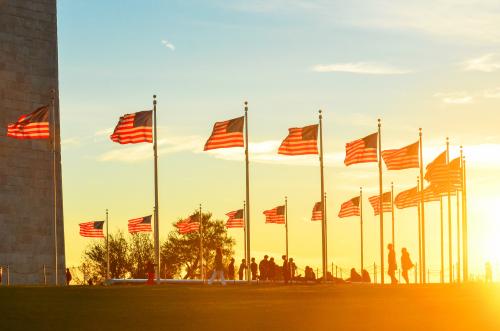
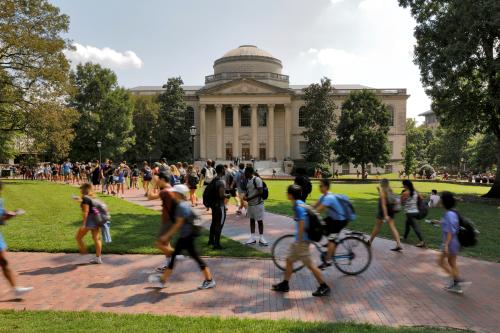
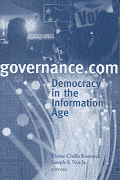
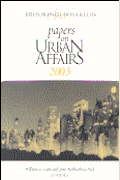
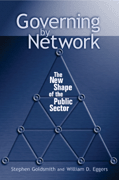

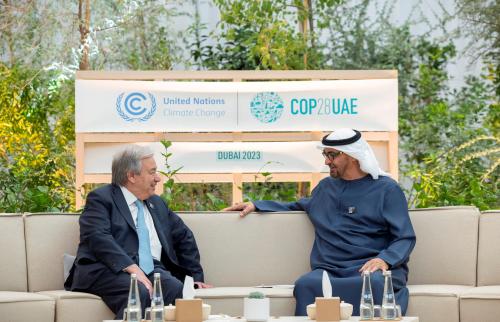

Commentary
The Angels of Our Nature: Restoring Unity of Purpose and Civility of Discourse in America—The Challenge to Think Tanks and Universities
February 7, 2011